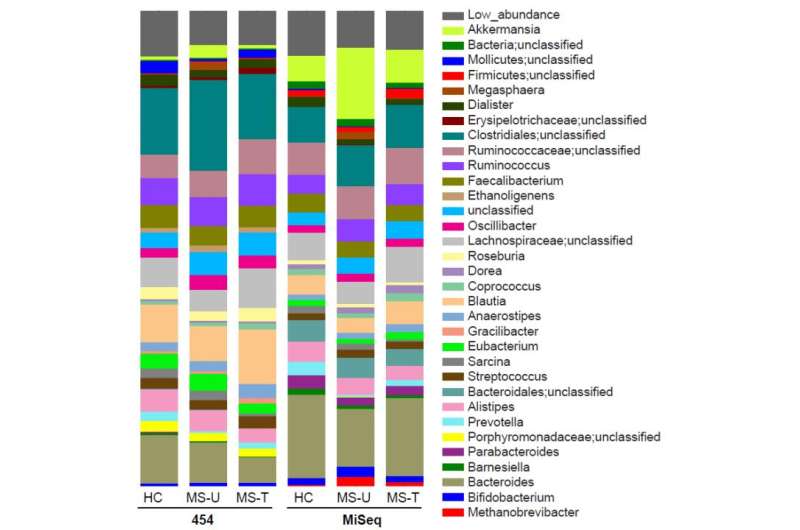June 29, 2016 report
Patients with multiple sclerosis found to have gut microbe changes

(Medical Xpress)—A team of researchers with Brigham and Women's Hospital at Harvard Medical School has discovered that people with multiple sclerosis appear to have differences in their gut biome than the rest of the population. In their paper published in the journal Nature Communications, the researchers describe testing they undertook of patients that had MS and of others in a control group, and the differences they found in levels of gut microbes between the two.
Multiple sclerosis (MS) is an incurable progressive disease that involves erosion of the myelin sheathing that covers nerve cells in the brain and spinal column. Patients who have it typically experience numbness in limbs, speech deterioration, problems with muscle control, trouble with vision and chronic fatigue. Prior research has suggested that it is an auto-immune disease –in this new effort, the researchers looked to the gut biome to determine if any changes might be present for those patients with the disease, because other auto-immune disease have been found to do so.
To find out, the researchers collected fecal samples from 63 people known to have MS, along with 43 samples from people without the disease. In studying the samples, the researchers found no measurable differences in overall biome diversity, but they did find elevated numbers of two types of bacteria—Methanobrevibacter and Akkermansia. To make sure the elevations were not due to medications given to MS patients, the team split the initial samples into two groups, those that had been treated with drugs, and those that had not. Both groups were found to have elevated levels of the bacteria—they also noted that both groups also had a slight decline in Butyricimonas.
The researchers then conducted a profile of related genes in T-cells looking for connections to the changes in the gut biome and found that there was a relationship between them and activation of interferon and other inflammatory pathways—the levels of which were consistent with the degree of bacterial gut level increases.
Finally, the team analyzed breath samples that had also been taken from all the patients and controls and found slightly elevated levels of methane in MS patients, which made sense, because the types of bacteria with elevated levels found in their biomes, were the type that are known to produce methane in the gut.

The results of the study suggest that biome testing could become a new means of testing for MS, charting its progression, or perhaps even as part of the development of drugs meant to treat it.
More information: Sushrut Jangi et al. Alterations of the human gut microbiome in multiple sclerosis, Nature Communications (2016). DOI: 10.1038/ncomms12015
Abstract
The gut microbiome plays an important role in immune function and has been implicated in several autoimmune disorders. Here we use 16S rRNA sequencing to investigate the gut microbiome in subjects with multiple sclerosis (MS, n=60) and healthy controls (n=43). Microbiome alterations in MS include increases in Methanobrevibacter and Akkermansia and decreases in Butyricimonas, and correlate with variations in the expression of genes involved in dendritic cell maturation, interferon signalling and NF-kB signalling pathways in circulating T cells and monocytes. Patients on disease-modifying treatment show increased abundances of Prevotella and Sutterella, and decreased Sarcina, compared with untreated patients. MS patients of a second cohort show elevated breath methane compared with controls, consistent with our observation of increased gut Methanobrevibacter in MS in the first cohort. Further study is required to assess whether the observed alterations in the gut microbiome play a role in, or are a consequence of, MS pathogenesis.
© 2016 Medical Xpress



















